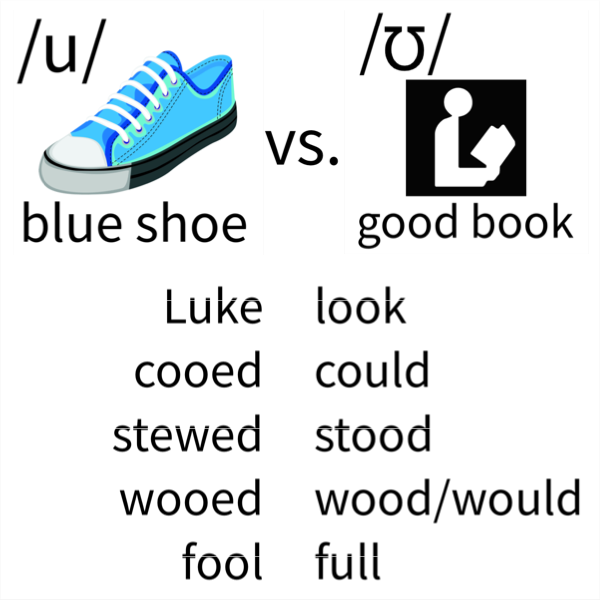|
0 Comments
In this class, we take a look at the some of the basics of American Intonation - what it is, and how to use it to be better understood when speaking English.
A common accent error is using the tense high back vowel /u/ in place of the lax high back vowel /ʊ/. Both vowels are rounded, and both can be spelled with the letters "oo," which creates confusion. Use the videos and lessons below to help you correctly differentiate and pronounce these two vowel sounds. In the video above, we look at the lax vowel /ʊ/. It is usually spelled with letter u, but in a few common words, it is spelled with "oo." In the video below, we look at how to know whether a word with the letters "oo" says /u/ or /ʊ/. Additional website practice for words spelled with "oo": https://www.speechmodification.com/free/how-to-pronounce-words-with-oo
A SMART Goal is Meaningful.
When I’m setting my goal, I want to make sure it relates to my life. It should be something that has an impact for me. I should feel good if I reach the goal, and it should make sense to me. I gave you a lot of examples of goals you can use on the way to improving your pronunciation, but you probably have some personal experiences that can help you figure out a meaningful goal for yourself. Let me give you an example from my life, and then we can look at some ideas related to pronunciation. If you were part of our first SMART goals class, you know that we set a specific goal. My goal is to practice 30 minutes a week on my singing because I want to become a better singer. The reason this goal is meaningful for me is that I sing in a choir, and I enjoy my rehearsals and concerts more if I’ve prepared well. I want to be a better singer so that my choir sounds good, and so I can do well with challenging music. I get a lot of pleasure out of singing, and I will feel more confident as a singer if I can improve. I’d like to be able to sing confidently in any situation, and I know that practicing frequently can help me with that. Another reason to make sure that your goal is meaningful is motivation. If you are trying to make a change, even a small change, that can be hard to do. When I tie in my specific goal to something that is personally meaningful, I can stay motivated to work towards the goals, even if it’s hard. I can think about the impact reaching the goal can have for me, and I will be more likely to stick with it. So, think about how your accent or your pronunciation affects your life. Is there something you’d like to see change? Maybe it’s just that you’re tired of being asked where you are from. Or maybe people ask you to repeat yourself. Maybe you would like to feel more confident when speaking English. Whatever the motivation, when you are picking your SMART goal, think about how it ties in to your personal experience. Make sure you’re working on something that will have a positive outcome for you. Maybe it’s as simple as getting your order right at the coffeeshop, or as complex as being a great public speaker, but when your SMART goal is meaningful, it will be effective. Welcome to Speech Modification’s New Years SMART Goals Challenge! In this challenge, we’re going to help you reach your goals, with lessons, videos, resources and community support. Our SMART goals will help you get organized, stay motivated, and celebrate your successes! I’m excited to take this challenge with you, so let’s get started! Okay, so what is a SMART goal? My SMART goals are based on the science of what actually works for improving your pronunciation. I’ve done the research so you don’t have to. I’m using SMART goals for myself right along with you, so we can celebrate our successes together. Let’s take a closer look. First, a SMART goal is SPECIFIC. When I specifically state my goal, I can measure my progress and celebrate meeting the goal. I might have a general goal of improving my communication, but when I get specific, I can more easily take the necessary steps to actually improve. Let me give you some examples: Say my general goal is better pronunciation. What do I do first? How am I going to be able tell if I’ve reached this goal? While better pronunciation is a great general goal, I need to be more specific than that. I can break it down to smaller steps which I can measure to show my progress. For example, I can choose the specific goal of spending 30 minutes a week practicing pronunciation. I can measure this goal. I can work my way up to it, and I can track my improvement from 0 minutes a week to 30 minutes a week. Another example of a specific goal would be to pronounce a specific sound pattern correctly when saying sentences. Let’s say I know I have difficulty with the R sound. My goal could be to say 10 sentences with R words correctly. I can practice sentences, record myself, and measure how many times I use R correctly until I can do 10 sentences with no accent errors on the R sound. Let’s set a specific goal. Think about your big, general goal, and then something specific you can do to work towards that big goal. Choose one of the ideas below, or use this sample and fill in your own idea. Leave your goal in the comments and share your ideas with our SMART Challenge students! Choose one of these examples, or use the formula to write your own!
I will practice pronunciation 30 minutes per week. I will say 10 sentences using an American R sound. I will pronounce the word “really” correctly in a sentence. I will use an American TH sound correctly 10 times in repeated phrase practice for “in the ____.” I will complete 1 SMART American Accent Training lesson per week for 6 weeks. I will ___________ (action) [Practice, pronounce, complete] ___________ (#/time) [10 times, 30 mins] per __________(time frame) [day/week/month]. |
Categories
All
Archives
May 2024
Have Questions?
Get A Free Consultation We offer a free 30-minute phone consultation. Schedule yours now. |




 RSS Feed
RSS Feed

